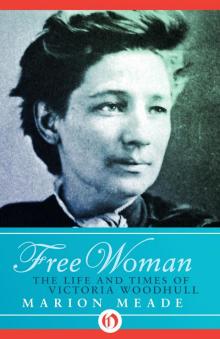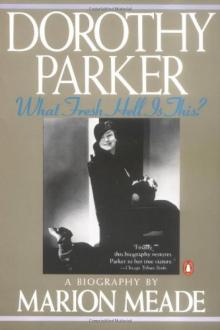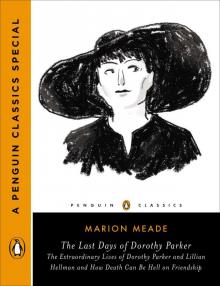- Home
- Marion Meade
Dorothy Parker: What Fresh Hell Is This? Page 10
Dorothy Parker: What Fresh Hell Is This? Read online
Page 10
On that Monday nothing could subdue the exuberance of the cub lions. As they laughed and boasted and ranted about Condé Nast, even the prospect of unemployment appeared trivial. After a giddy lunch at the Algonquin, they strolled back to the office, where they began telephoning people they knew to advertise their availability. Still full of high spirits once the office closed, they ploughed through the snow-covered street to the Gonk, where they were joined by Aleck Woollcott and Gertrude Benchley, who had offered no objections to her husband’s decision. Over dinner, questioned by interested reporters who had heard rumors of a walkout at Vanity Fair, they began to discuss their plans for the future. Benchley thought that it would have been pleasant if they could have continued at Vanity Fair, “but it probably is better for all of us to do things for ourselves.” Why shouldn’t they become successful free-lancers who could write what they liked, instead of working for people like Condé Nast? There was no telling what they could do on their own. Now it might even be possible for Dorothy and Benchley to work on the play they had been talking about.
By midnight Monday, Dorothy had stopped worrying. Getting fired might be a mercy. The next morning, she was sure of it. The New York Times carried a news story, sympathetically worded by Woollcott, announcing her dismissal from Vanity Fair. It was the sort of invaluable publicity that the unemployed can’t buy. Attention to her plight continued. Before the week was out, she received a second plug when Frank Adams wrote in The Conning Tower: “R. Benchley tells me he hath resigned his position with ‘Vanity Fair’ because they had discharged Dorothy Parker; which I am sorry for.”
The trio went through the motions of working. In the lobby of the building, they hung a poster that asked people to make CONTRIBUTIONS FOR MISS BILLIE BURKE, though nobody did. They amused themselves by pinning red discharge chevrons on their sleeves and parading raffishly around the office. Dorothy was proud to recall that “we behaved very badly.”
Later that same week the manufacture, sales, and transportation of liquor was banned in the United States, thus marking the start of thirteen years of Prohibition. It was an historical event of no particular interest to Dorothy, who to be sociable would accept a gin daisy at a party but nurse it all evening. Benchley, an ardent prohibitionist, hailed the ratification of the Eighteenth Amendment as “too good to be true” and insisted that the country was taking a “step toward Utopia.”
Since just about the only people remaining on Vanity Fair’s editorial staff were the secretaries, Crowninshield asked Edmund Wilson to read a few manuscripts as a tryout. He apparently passed the trial because Crownie suggested he fill in for Benchley, which meant that he was given the duties of managing editor with neither the title nor the salary. Dorothy and Benchley, recalled Wilson, “joked about my being a ‘scab,’ but were kind about showing me the ropes and took me for the first time to the Algonquin.” At lunch they regaled him with office gossip. Their attempts to poison his mind fell on fertile ground because ever after he would think of Crowninshield as a “born courtier who lacks an appropriate court” and of Condé Nast as “the glossiest bounder I have ever known.”
On January 25, Dorothy and Sherwood cleaned out their desks and departed; Benchley’s contract required him to remain until the end of the month. Dorothy’s first free-lance job was writing subtitles for a movie, D. W. Griffith’s Remodeling Her Husband, which was being directed by Lillian Gish. When she went up to the newly opened Griffith studio in Mamaroneck, New York, she took Sherwood with her because she hoped that Gish might have work for him as well. Sherry was far more interested in moving pictures than she, but unfortunately Gish did not need him.
Her screen-writing job lasted a week. For a scene in which James Rennie is having his nails manicured in a barber shop, she borrowed from Hamlet’s speech to Horatio and wrote: “The divinity that shapes our ends.” Since this was more or less on a par with her caption writing for Vogue, she may have felt the work uncomfortably regressive. In any case, she sought no further movie work.
At the beginning of February, she moved into an office with Benchley in the Metropolitan Opera House studios, near Times Square. It was a single, jerry-built room on the third floor, little more than a triangular section of hallway that had been partitioned off. It was heated, had a window overlooking Broadway, and cost thirty dollars a month, which was actually no bargain considering its size. “An inch smaller,” joked Dorothy, “and it would have been adultery.”
There was no adultery—nor would there ever be—but they were unquestionably a couple. In 1920, friendship between a woman and a man was not unheard of, but it was uncommon when both people were married, for it was imagined that a spouse would provide all the companionship a person needed. In the case of Dorothy and Benchley, neither of whom were able to confide fully in their mates, they complemented each other psychologically, indeed were kindred souls. Robert Sherwood, who had been obliged to figure all this out during his months at Vanity Fair, described their relationship as intellectual. Nevertheless, he could see that Gertrude was terribly jealous, a reaction that was hardly surprising since they completely excluded her from participation in their friendship.
In the new office, they behaved like impoverished pseudo-newlyweds who were setting up housekeeping. They furnished their cubbyhole with a pair of grubby kitchen tables, three chairs (one for a guest), a hat rack, and their typewriters, all the necessary paraphernalia of writers, and they decorated the walls with their collection of undertaking photographs. Benchley brought in his boyhood diaries and left them open for Dorothy, or anyone else, to browse through. On a bulletin board, they left notes for each other. Before long the office began to fill up with untidy heaps of undertakers’ magazines and yellowing newspapers. They talked about having the door lettered with the words UTICA DROP FORGE AND TOOL CO., ROBERT BENCHLEY, PRESIDENT—DOROTHY PARKER, PRESIDENT, but abandoned the idea, also about applying for the cable address PARKBENCH, but decided the likelihood of anyone sending them a cable was slim. Outside it was a nasty winter with drifts of dappled gray snow and piles of garbage that lay uncollected for a week, but it was cozy in their hideaway, and they delighted in playing house.
Friends were constantly dropping in. Marc Connelly’s job on the Morning Telegraph, a paper printing so much theatrical news it was known as “the chorus girl’s breakfast,” was not particularly taxing. When he needed a convenient place to pass the time, he would come in to visit or to amuse himself by reading Benchley’s diaries. “There was always a laugh to be had with Bob or Mrs. Parker because they didn’t care what they said or did. They would lean out of their window and shout ‘ya, ya’ to people walking along Broadway. Somehow they managed to get pieces done but it was hard to understand how.” Another visitor impressed by the fun they were having together was Charles Baskerville, an up-and-coming artist who was illustrating some of Dorothy’s verse for Life. Mrs. Parker, he remembered, “was gay and jokey and, oh, was she cute.”
Very quickly Dorothy found herself another position as drama critic. Ainslee’s was a literary magazine, respectable enough but steps beneath Vanity Fair in both class and circulation. They gave her a monthly column called “In Broadway Playhouses,” where she was permitted to express her opinions as bitchily as she pleased. She found that she could tap out the reviews with little thought while reserving her energy for the assignments she was getting from more prestigious magazines. During much of the winter she worked on a long piece about the Ouija-board craze for The Saturday Evening Post, then went on to contribute four major articles to the Ladies’ Home Journal. She also made up her quarrel with Vanity Fair, at least with Crowninshield, who had asked her to coauthor a book with him. High Society was to be a snobby little satire giving hints on how to deal with “dowagers, dinners, debutantes, dances, and the thousand and one diversions of persons of quality,” with drawings by Fish and captions by Dorothy, Crowninshield, and George Chappell. When she visited the Vanity Fair offices to see Crownie or to chat with Bunny Wilson, the sec
retaries whispered among themselves that the real reason for her dismissal was that she had suggested Billie Burke had thick ankles. While Dorothy had forgiven Crownie, her hatred of Condé Nast had not abated. One day, when she and Wilson encountered him in the lobby of the Algonquin, all parties were at pains to reveal no hard feelings. Nast told her he was planning an ocean cruise. “And Dorothy,” he said, “I wish you would come with me.”
“I wish I could,” she replied. But when Nast had walked on, she turned to Wilson and burst out, “Oh, God, make that ship sink!”
After her winter of hard labor money had piled up in her bank account. Benchley too was thriving as an advertising copywriter and book reviewer for the World at a hundred dollars a column. In April, after Robert Sherwood became assistant editor of Life, the humor magazine offered Benchley the position of drama critic, a job that paid a hundred dollars a week plus seven cents a word for additional contributions. About this time, he learned that his rented Crestwood house was to be sold. He and Gertrude found a house they wanted to buy in nearby Scarsdale, but it cost $17,500 and required a $4,200 down payment. A friend offered to loan him bonds as collateral and he borrowed two hundred dollars from Dorothy, which he used to open an account at the Lincoln Trust Company. He then asked the bank to lend him four thousand dollars on the bonds, gave Dorothy back her two hundred dollars, and made up the difference from his paycheck. It was a magical transaction that took place in less than an hour, but the magic to Dorothy was that she had two hundred dollars.
The Life job brought significant changes in Benchley’s habits. He had kept commuter’s hours and hustled back to the suburbs in time for dinner each night. With eight or ten plays opening in a week, he was lucky if he averaged one meal a week with Gertrude on the new job. Often he changed into his evening clothes in a ten-cent cubicle in the men’s room at Grand Central. After a show, if his deadline was close, he stayed in town and slept on the sofa at Dorothy and Eddie’s apartment or at Sherwood’s.
Throughout the spring, Dorothy’s intimacy with Benchley deepened. She told him that she dreamed of doing serious writing—short stories, perhaps a novel, and of course the play they had talked of writing together. He told her about his interest in the Queen Anne period and how he wanted to write a history of the humorists who had lived at that time. Despite their successes since leaving Vanity Fair, they continued to feel insecure about money. They worried about responsibilities they no longer wanted and the costs exacted by one’s foolish choices. In both of their lives, many things were not going perfectly, but it was lucky they knew each other. With a good pal, they knew they would be all right.
An exclusive luncheon club, whose membership he controlled and where he could be the centerpiece, was a delicious idea to Aleck Woollcott. He adored a captive audience at lunch, and, in fact, had a compulsive need for company at all meals. He felt most comfortable when surrounded by friends who tolerated his affectionate abuse, giving as good as they got. No doubt his communal beginnings at the Phalanx accounted for some of this. Now he began to promote subtle changes in the little group that turned up regularly for lunch at the Gonk. The previous fall they had been simply a bunch of writers who wanted a convenient place to eat and “that’s about all,” as George Kaufman later explained. Aside from the professional advantages of having an opportunity to trade shoptalk, meeting for lunch at the Algonquin proved to be relaxing and the food was good. Even though they came in every day, they attracted little attention from either the management or other customers. The Algonquin’s main restaurant, opposite the lobby, was the Rose Room, where it was not unusual to catch sight of theatrical celebrities such as John Barrymore or Douglas Fairbanks. The writers, however, ate at a long table in the Pergola Room (now the Oak Room), a smaller dining room that was decorated with murals depicting the Bay of Naples. From the outset they tended to be cliquish; nobody sat at their table without an invitation and they referred to themselves as “the Board” and to their lunches as “Board Meetings.”
Frank Case appeared unwilling to accept them as full-fledged adults. At that time “none of the boys or girls had done anything in particular,” he wrote. Nor was he convinced they ever would, though naturally the “big man” of the group was F.P.A. because he had the largest salary and a column that could bestow fame on anyone lucky enough to land in it. The rest of the group impressed Case as nothing more than hardworking hopefuls. Woollcott, despite his affectations, was beginning to achieve some popularity. Broun and Benchley were highly regarded journalists but without big followings. Nobody had heard of George Kaufman, who was earning four thousand dollars a year at the Times. Case noticed among the men at Woollcott’s table “a young girl” who shook wisecracks out of her sleeve. She would “simply sit, now and then saying something at which the others would laugh and that was the end of it.” How was he to have known, he protested, that she was a wit? As for Harold Ross, Case must have examined him with an air of incredulity because he described him as “a sort of adopted child, taken in on approval before the final papers were signed.”
The most striking fact about the writers was their vitality and the intense pleasure they seemed to take in one another’s company. They were always laughing and joking, clearly having a terrific time. Unfortunately, the jokes never earned them any money. Two press agents who sometimes ate with them were Herman Mankiewicz and Murdock Pemberton. After lunch one day, as everyone was leaving the hotel, Mankiewicz shook his head sadly as he watched them disperse. He said to Pemberton, “There goes the greatest collection of unsalable wit in America.”
But not for long. Soon they were naming their own price and it was Frank Case, for all his seeming indifference, who proved instrumental in helping them. Not only did he provide a free clubhouse, he also was responsible for an Arthurian table and a concept that lent itself to the creation of a legend. In her book The Vicious Circle, Case’s daughter Margaret wrote that “the Algonquin Round Table came to the Algonquin Hotel the way lightning strikes a tree, by accident and mutual attraction.” Before long her father noticed the size of the group expanding as they pulled up chairs from other tables, overflowed into the aisles and to adjoining tables, and created traffic problems. For practical reasons Case decided to move them to a front table in the Rose Room. That failed to solve the problem either, for even more people showed up to eat with them. Next he seated them at a large round table in the rear of the dining room and gave them a waiter of their own. The sheer size of the table and its location at center stage, plus the fact that Woollcott frequently entertained prominent persons, drew stares from other customers, even those who were important themselves. They fell over themselves to see if Minnie Maddern Fiske was sitting at the round table. Some began asking Georges the headwaiter to identify people who were lunching at the round table: Was that Mencken? H. G. Wells? A cartoonist for the Brooklyn Eagle, Edmund Duffy, published a caricature of the group and he labeled it the Algonquin Round Table. The name stuck. Newspaper columnists were hungry to publish quips that had originated at the Round Table. All this was good for the restaurant’s business, as Frank Case was pleased to notice. He must have decided the boys and girls were growing up, because before long he stopped providing them with free popovers and celery.
Charter members of the Round Table were Aleck Woollcott, Heywood Broun, Frank Adams, John Peter Toohey, Robert Benchley, George Kaufman, Marc Connelly, Robert Sherwood, Harold Ross, and Dorothy. Throughout the early twenties the number of regulars kept climbing and eventually reached thirty or more. At one time or another, Frank Sullivan and Charles MacArthur were participants, as were Herman Mankiewicz, Harpo Marx, Donald Ogden Stewart, Murdock Pemberton, and Deems Taylor. So were Arthur Samuels of Harper’s Bazaar, novelist Alice Duer Miller, playwright Laurence Stallings, and poet John V. A. Weaver.
A comparative latecomer was Edna Ferber, a writer best known for her popular stories about a traveling saleswoman who peddled ladies’ underwear. Ferber was small and homely, thirty-four claiming to be t
hirty-two, a fiercely driven woman who called herself “a stagestruck Jewish nun.” She dreamed of writing novels that would explore colorful periods in American history, but when she first came to the Round Table in 1921, she had yet to produce such successful works as Show Boat. She had known Woollcott for some years and wrote him a plaintive request: “Could I maybe lunch at the Round Table once?” After that, she was included in the group, even though her appearances at the hotel were infrequent. A compulsive worker who preferred to lunch at her desk, she socialized with the group after business hours. When Ferber showed up, she could parry and thrust with the best of them. On one occasion, Noel Coward had been invited. Both he and Ferber were wearing double-breasted suits.
“You almost look like a man,” remarked Coward.
“So do you,” she replied.
Another writer often associated with the Round Table but seldom seen there was Ring Lardner, a highly paid sportswriter and humorist who had been born in Niles, Michigan, and covered baseball for the Chicago Tribune. Lardner was an almost pathologically silent man in his mid-thirties with bulging eyes and an expressionless face. For many years a heavy drinker, he had developed into a full-fledged alcoholic. His pattern was periods of abstinence alternating with binges that lasted weeks or sometimes months. By 1920, having left the Tribune for a job as a syndicated national columnist with the Bell Syndicate, Lardner was earning thirty thousand dollars from his column alone and decided to move east. Eventually he purchased a house in Great Neck, New York, where he lived with his wife, Ellis, and their four sons, and where he also worked, coming into the city only for business or drinking. Although Lardner had mixed feelings about the Round Table, they honored him with an intensity that bordered on reverence and considered him a master of the short story. They also envied him because, Broun said, “he wrote what he wanted to.” Edmund Wilson suspected that they badly needed “such a presiding but invisible deity, who is assumed to regard them with a certain scorn.”

 Eleanor of Aquitaine
Eleanor of Aquitaine Free Woman
Free Woman Unruly Life of Woody Allen
Unruly Life of Woody Allen Bobbed Hair and Bathtub Gin
Bobbed Hair and Bathtub Gin Madame Blavatsky
Madame Blavatsky Stealing Heaven
Stealing Heaven Dorothy Parker: What Fresh Hell Is This?
Dorothy Parker: What Fresh Hell Is This? The Last Days of Dorothy Parker
The Last Days of Dorothy Parker